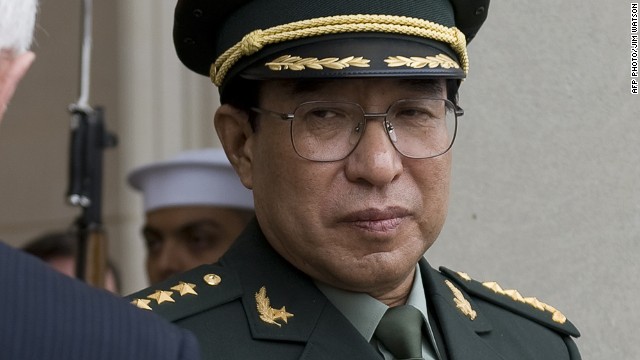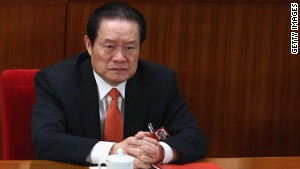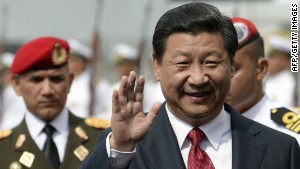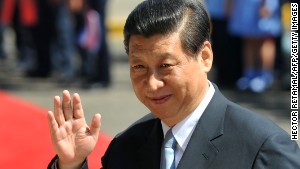Is Xi serious about cracking down on corruption?
By Jamie Metzl, Special to CNN
Editor’s
note: Jamie Metzl is a Senior Fellow at the Asia Society. He served in
the National Security Council and State Department during the Clinton
administration. You can follow him @jamiemetzl or visit his website. The views expressed are his own.
There are many signs that Chinese President Xi Jinping’s unprecedented anti-corruption drive is serious. In recent weeks, an investigation was launched into former security chief and Politburo Standing Committee member Zhou Yongkang, while former top General Xu Caihou was expelled from the Communist Party. Nearly 200,000 party members of
all levels have reportedly been disciplined for corruption over the
last two years. But if this top down approach is not matched by a
bottom-up empowerment of the people being most harmed by China’s
corruption pandemic it will have little chance of success.
China’s
leadership faces a crisis of confidence among the Chinese people.
Endemic corruption has become the rule rather than the exception,
highlighted in the social media the government is straining to contain.
Downstream effects of corruption – environmental degradation, food and
consumer safety lapses, massive inequality, and thwarted innovation to
name a few – are suppressing the natural talents of the Chinese people
and causing many of China's most capable to emigrate.
Xi
has promised that the anti-corruption campaign will snare “tigers” as
well as “flies,” senior leaders as well as smaller fry, and he has been
true to his word. Those charged include officials from all levels and
associated with virtually all major factions.
But
because corruption is so pervasive, it’s difficult not to see political
and public relations motives. When Chinese media reports critically on
the vast wealth accrued by the families of former Chongqing leader Bo Xilai, Zhou Yongkang, and others, it’s easy to remember the Bloomberg and New York Times reports on the millions of dollars held by Xi’s and former Premier Wen Jiabao’s families.
And no one believes that China’s government leaders, among the
wealthiest in the world, are getting rich from their salaries alone.
This
corruption passes from the top down. Officials in senior positions
receive bribes from businessmen they then use to secure their own
promotions and strengthen their essential patronage networks according
to qian gui ze,
the “hidden rules” of the road. It doesn’t end there. Parents in
schools across China are expected pay teachers to ensure fair treatment
for their children, journalists require envelopes of cash for attending
press conferences, doctors in public hospitals demand payment for
providing care. Nearly everyone with something to offer can expect
additional payments under the table.
For
Xi, cracking down on the likes of Zhou in the name of anti-corruption
removes his most powerful rivals, demonstrates power consolidation, and
is good public relations. But ultimately, corruption in China is not a
cancer on the system, it is the essence of it.
Xi
and his team are no doubt betting that a top down approach can clean up
the system enough, or at least make it look like they doing enough, to
prevent the party and government from being delegitimized, while at the
same time maintaining the party’s dominant role. But while it might be
conceptually possible for China to address its corruption problem with a
Singapore-like good governance approach if its leaders were willing to
take vows of chastity and poverty, the far likelier bet is that it can’t
because the party itself is the problem. As long as the party remains
above the law with zero transparency or public accountability, leaders
like Zhou are expelled while others have amassed far greater spoils are
exempt, and Chinese citizens are sent to jail for protesting official
corruption or advocating that China live up to its own constitution,
that problem will remain.
If,
on the other hand, Xi is serious about addressing corruption, he will
need to push the kinds of political reforms required to facilitate
bottom-up pressure for accountability and good governance – rule of law,
sunshine and disclosure legislation, a free press, conflict of interest
rules, supporting non-governmental watchdog groups, empowering the
public, etc. Ultimately, but not necessarily immediately, the Chinese
Communist Party will need a mandate by the people conferred through
meaningful elections.
Although
the Chinese government has delivered spectacular results in many areas
over past decades, China is now at a crossroads where nearly every major
problem stems ultimately from the distortions of its political system.
For the country to realize its potential, these distortions must be
addressed.
Since
taking over two years ago, Xi has moved steadily to consolidate power
and isolate his rivals. Up to this point, the anti-corruption campaign
can only be seen as part of this process. The big question, however, is
consolidating power for what? If Xi proves to be moving strategically
towards implementing the political reforms China needs to address its
corruption and unlock the great potential of its people in a more open,
distributed, and creative system, then the anti-corruption drive will
have meaning. The announcement that the party plenum scheduled for
October will address legal reform issues is a positive potential step in
the right direction.
But
if Xi does not push for political reforms, the campaign will simply
look like a risky political and public relations maneuver to get rid of
rivals, an approach that won’t get China out of its morass.
I hope it’s the former, but the jury is still out.
| Post by:CNN's Jason Miks |
China's biggest 'military tiger' Xu Caihou confesses to taking bribes
By Paul Armstrong and Steven Jiang, CNN
updated 1:18 AM EDT, Wed October 29, 2014

Xu Caihou was also expelled from the Communist Party and had his rank of general revoked.
STORY HIGHLIGHTS
- Xu was a former vice chairman of the Central Military Commission
- Statement: He took advantage of his position to promote others and take bribes
- Xu is the most senior military leader to face corruption charges in recent memory
- Was one of four senior members to be expelled from the ruling Communist Party
Hong Kong (CNN) --
A top retired general has confessed to taking bribes, becoming the
highest-profile figure in China's military to be caught up in President
Xi Jinping's war on corruption.
Xu
Caihou, formerly the vice chairman of China's Central Military
Commission that runs the two-million strong People's Liberation Army
(PLA), was also expelled from the Chinese Communist Party and had his
rank of general revoked, according to a statement from military
prosecutors cited by the state-run Xinhua news agency Wednesday.
The
seven-month investigation, which began in March this year, found that
Xu took advantage of his position to assist the promotion of other
people, accepting huge bribes personally and through his family.
He
was also found to have sought profits for others in exchange for bribes
taken through his family members. The amount of bribe was "extremely
huge", the statement added.
The allegations against Xu, 71, were announced on June 30 when
President Xi presided over a leadership meeting to expel the retired
general and three other senior members from the ruling Communist Party.



Zero tolerance
In
a statement released after that meeting, President Xi and other Chinese
leaders reiterated their "zero tolerance" for corruption in the
government and military -- long a lightning rod for mass discontent
across the country -- but they also acknowledged the anti-graft task
would be "ongoing, complex and formidable."
The
three other former senior officials ousted from the Communist Party for
corruption were Jiang Jiemin, a former minister in charge of state
assets; Li Dongsheng, a former vice minister of public security; and
Wang Yongchun, a former deputy head of state-owned oil behemoth China
National Petroleum Corporation.
State
media characterized Xu as a big "military tiger" caught in the massive
anti-graft campaign launched by President Xi, who is also the
commander-in-chief. After becoming the head of the Communist Party in
late 2012, Xi banned official extravagance -- from banquets to year-end
gifts -- and vowed to target "tigers and flies" alike in his fight
against corruption when describing his resolve to spare no one
regardless of their position.
Xinhua recently touted the catching of 30 "tigers" since Xi took power less than two years ago.
Zhou Yongkang
Some
China watchers have noted ties between an increasing number of
disgraced officials to Zhou Yongkang, the former domestic security czar
who has been rumored to be under investigation for some time. Jiang, Li
and Wang have long been considered Zhou protégés.
State
media has reported official probes into many of Zhou's family members
as well as former associates in the domestic security apparatus, state
oil industry and southwestern Sichuan Province -- three places Zhou once
ruled. If announced, Zhou would become the highest-ranking official
ever to face corruption charges in the history of the People's Republic.
In
2013, some 182,000 officials were disciplined while courts nationwide
tried 23,000 corruption cases, according to the Communist Party's
disciplinary commission.
State
media has cited the trial and conviction last year of former
high-flying politician Bo Xilai -- though called politically motivated
by Bo supporters -- as one prime example of President Xi's determination
to clean up the Party.
No comments:
Post a Comment